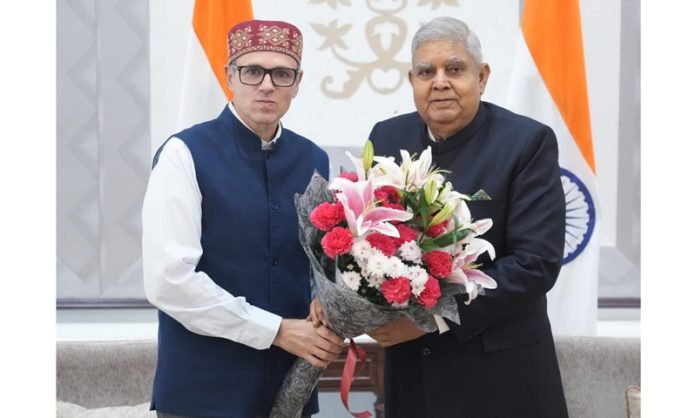New Delhi, November 2024 — Jammu and Kashmir Chief Minister Omar Abdullah is currently on an official visit to Delhi, where he met with Vice-President Jagdeep Dhankhar on Wednesday. The meeting, which lasted over 30 minutes, focused on various issues concerning the region, officials reported.
A picture of the two leaders exchanging greetings was shared on the official X handle of the Vice-President’s office. The caption read: “Omar Abdullah, Chief Minister of Jammu and Kashmir, called on Vice-President Jagdeep Dhankhar at Vice-President’s Enclave today.”
Abdullah, who arrived in Delhi on Monday evening, is expected to meet with President Droupadi Murmu and Union Finance Minister Nirmala Sitharaman in the coming days, sources said.
Indus Water Treaty: Jammu and Kashmir’s Hydropower Struggles
On Tuesday, Abdullah attended a conference of Power Ministers of States and Union Territories. During his address, he raised concerns about the Indus Water Treaty, which he believes is limiting Jammu and Kashmir’s ability to fully utilize its vast hydropower resources.
The Indus Water Treaty, signed between India and Pakistan in 1960, restricts Jammu and Kashmir’s power generation capabilities, especially during winter months when power production drops significantly. Abdullah emphasized that this has created serious hardships for local residents. The treaty’s clauses restrict the state to only run-of-the-river projects, preventing large-scale storage-based hydropower projects that could tap into the region’s potential.
“Hydel power is Jammu and Kashmir’s only viable energy source,” Abdullah said. “However, due to the treaty’s limitations, the region is forced to rely on power imports from other states, which adversely impacts its economy.”
Calls for Special Compensation from the Centre
Given these challenges, Abdullah called for special compensation from the Centre to help Jammu and Kashmir unlock its full hydropower potential. He proposed that the government provide viability gap funding and equity assistance to support hydropower projects that could drive economic growth and address the region’s energy needs.
This appeal comes amid growing concerns about Jammu and Kashmir’s development and its ability to harness its natural resources for economic benefit. The Centre’s response to these requests could play a crucial role in shaping the region’s future energy and economic landscape.



